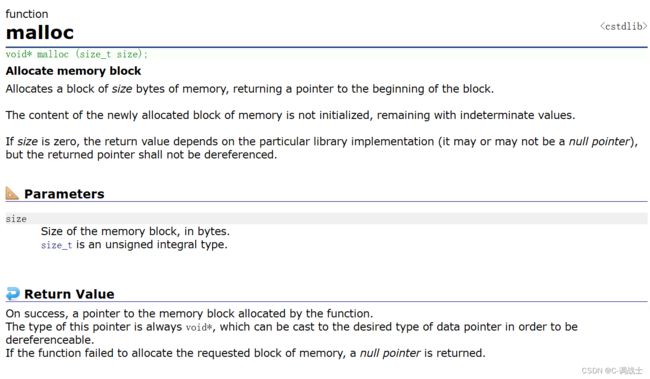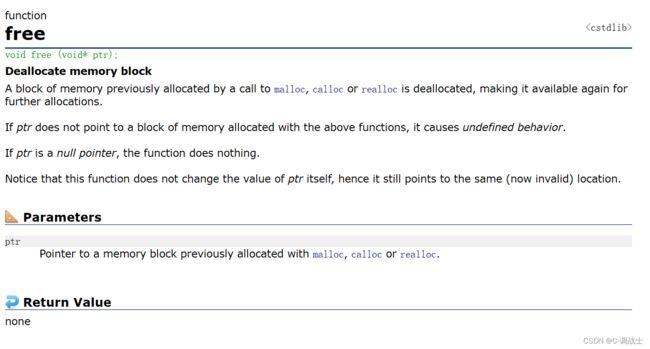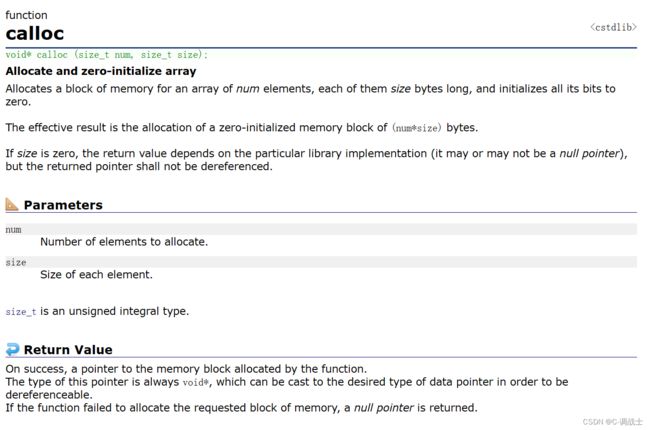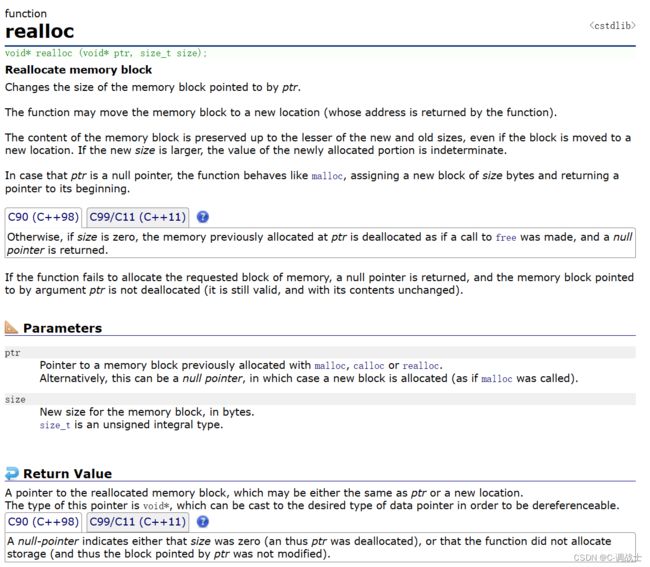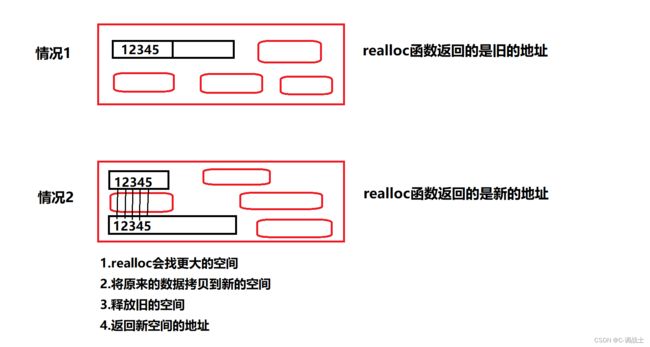动态内存管理【上篇】
文章目录
- ⚙️1.为什么存在动态内存分配
- ⚙️2.动态内存函数的介绍
-
- 2.1. malloc函数
- 2.2. free函数
- 2.3. calloc函数
- 2.4. realloc函数
- ⚙️3.常见的动态内存错误
-
- 3.1.对NULL指针的解引用操作
- 3.2.对动态开辟空间的越界访问
- 3.3.对非动态开辟内存使用free释放
- 3.4.使用free释放一块动态开辟内存的一部分
- 3.5.对同一块动态内存多次释放
- 3.6.动态开辟内存忘记释放(内存泄漏)
- ⚙️4.经典笔试题
-
- 4.1.题目(1)
- 4.2.题目(2)
- 4.3.题目(3)
- 4.4.题目(4)

⚙️1.为什么存在动态内存分配
我们已经掌握的内存开辟方式有:
int val = 20; //在栈空间上开辟4个字节
char arr[10] = {0}; //在栈空间上开辟10个字节的连续空间
但是上述的开辟空间的方式有两个特点:
1.空间开辟大小是固定的
2.数组在声明的时候,必须指定数组的长度,它所需要的内存在编译时分配
但是对于空间的需求,不仅仅是上述的情况。有时候我们需要的空间大小在程序运行的时候才能知道,那数组的编译时开辟空间的方式就不能满足了。
这时候就只能试试动态开辟了
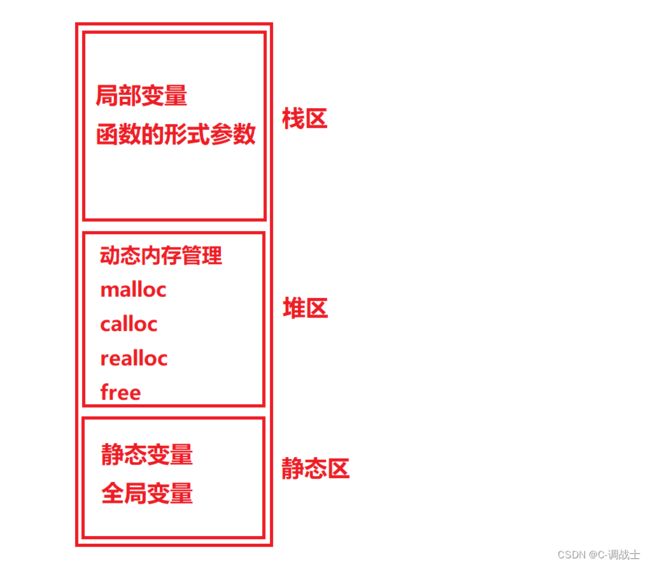
⚙️2.动态内存函数的介绍
2.1. malloc函数
C语言提供了一个动态内存开辟的函数:
void* malloc(size_t size);
这个函数向内存申请一块连续可用的空间,并返回指向这块空间的指针
如果开辟成功,则返回一个指向开辟好空间的指针
如果开辟失败,则返回一个NULL指针,因此 malloc函数的返回值一定要做检查
返回值的类型是void* ,所以 malloc函数并不知道开辟空间的类型,具体在使用的时候使用者自己来决定
如果参数 size为0,malloc的行为是标准是未定义的,取决于编译器
2.2. free函数
C语言提供了另外一个函数free,专门是用来做动态内存的释放和回收的,函数原型如下:
void free(void* ptr);
free函数用来释放动态开辟的内存
如果参数ptr指向的空间不是动态开辟的,那么 free函数的行为是未定义的
如果参数ptr是NULL指针,则 free函数什么事都不做
malloc函数与free函数相配合着使用:
请看代码与注释
#includemalloc和free函数都声明在
头文件中
2.3. calloc函数
C语言还提供了一个函数calloc,calloc函数也用来动态内存分配,函数原型如下:
void* calloc(size_t num,size_t size)
函数的功能是为num个大小为size的元素开辟一块空间,并且把空间的每个字节初始化为0
与函数malloc的区别只在于calloc会在返回地址之前把申请的空间的每个字节初始化为0
举个栗子
int main()
{
int* p = (int*)calloc(10, sizeof(int));
if (p == NULL)
{
printf("calloc()-->%s\n", strerror(errno));
return 1;
}
//使用
int i = 0;
for (i = 0; i < 10; i++)
{
printf("%d ", p[i]);
}
//释放
free(p);
p = NULL;
return 0;
}
所以如果我们对申请的内存空间的内容要求初始化,那么可以很方便的使用calloc函数来完成任务
calloc和malloc的对比:
1.参数不一样
2.都是在堆区上申请内存空间,但是malloc不初始化,calloc会初始化为0如果要初始化,就使用calloc
不需要初始化,就可以使用malloc
2.4. realloc函数
realloc函数的出现让动态内存管理更加灵活
有时我们会发现过去申请的空间太小了,有时候我们又会觉得申请的空间过大了,那为了合理的使用内存,我们一定会对内存的大小做灵活的调整。那 realloc函数就可以做到对动态开辟内存大小的调整
函数原型如下:
void* realloc(void* ptr,size_t size);
ptr是要调整的内存地址
size调整之后新大小
返回值为调整之后的内存起始位置
这个函数调整原内存空间大小的基础上,还会将原来内存中的数据移动到新的空间
realloc在调整内存空间的时候存在两种情况:
情况1:原有空间之后有足够大的空间:
要扩展内存就直接在原有内存之后直接追加空间,原来空间的数据不发生变化
情况2:原有空间之后没有足够大的空间:
扩展的方法是:在堆空间上另找一个合适大小的连续空间来使用,这样函数返回的是一个新的内存地址
int main()
{
int* p = (int*)malloc(20);
if (p == NULL)
{
printf("%s\n", strerror(errno));
return 1;
}
//使用
int i = 0;
for (i = 0; i < 5; i++)
{
p[i] = i + 1;
}
int* ptr = (int*)realloc(p, 40);
if (ptr != NULL)
{
p = ptr;
}
else
{
printf("realloc: %s\n", strerror(errno));
}
//使用
for (i = 5; i < 10; i++)
{
p[i] = i + 1;
}
for (i = 0; i < 10; i++)
{
printf("%d ", p[i]);
}
//释放
free(p);
p = NULL;
return 0;
}
⚙️3.常见的动态内存错误
3.1.对NULL指针的解引用操作
请看代码与注释
int main()
{
int* p = (int*)malloc(20);
//可能会出现对NULL指针的解引用操作
//所以malloc函数的返回值是要判断的
int i = 0;
for (i = 0; i < 5; i++)
{
p[i] = i;
}
free(p);
p = NULL;
return 0;
}
3.2.对动态开辟空间的越界访问
请看代码与注释
int main()
{
int* p = (int*)malloc(20);
if (p == NULL)
{
printf("%s\n", strerror(errno));
return 1;
}
int i = 0;
//越界访问
for (i = 0; i < 10; i++)
{
p[i] = i;
}
free(p);
p = NULL;
return 0;
}
3.3.对非动态开辟内存使用free释放
请看代码与注释
int main()
{
int arr[10] = { 1,2,3,4,5 };
int* p = arr;
//....
free(p);
p = NULL;
return 0;
}
3.4.使用free释放一块动态开辟内存的一部分
请看代码与注释
int main()
{
int* p = (int*)malloc(40);
if (p == NULL)
{
printf("%s\n", strerror(errno));
return 0;
}
int i = 0;
//[1] [2] [3] [4] [5] [ ] [ ] [ ] [ ] [ ]
for (i = 0; i < 5; i++)
{
*p++ = i + 1;
p++;//这里p不再指向动态内存的起始位置
}
//释放(p必须指向起始位置地址)
free(p);
p = NULL;
return 0;
}
3.5.对同一块动态内存多次释放
请看代码与注释
int main()
{
int* p = (int*)malloc(20);
if (p == NULL)
{
printf("%s\n", strerror(errno));
return 1;
}
//使用
//
free(p);
//释放
free(p);//(释放过一次就不能再进行释放了)
p = NULL;
return 0;
}
3.6.动态开辟内存忘记释放(内存泄漏)
请看代码与注释
void test()
{
int* p = (int*)malloc(100);
if (NULL != p)
{
*p = 20;
}
}
int main()
{
test();
while (1);
}
malloc、calloc、realloc所申请的空间,如果不想使用,需要free释放
如果不使用free释放:
程序结束之后,也会由操作系统回收
如果不使用free释放,程序也不结束 ---- 内存泄漏
自己申请的,尽量自己释放
自己不释放的,告诉别人释放
⚙️4.经典笔试题
4.1.题目(1)
void GetMemory(char* p)
{
p = (char*)malloc(100);
}
void Test(void)
{
char* str = NULL;
GetMemory(str);
strcpy(str, "hello world");
printf(str);
}
int main()
{
Test();
return 0;
}
1.调用GetMemory函数的时候,str的传参为值传递,p是str的临时拷贝,所以在GetMemory函数
内部将动态开辟空间的地址存放p中的时候,不会影响str,所以GetMemory函数返回之后,str中依然是
NULL指针。strcpy函数就会调用失败,原因是对NULL的解引用操作,程序会崩溃
2.GetMemory函数内容malloc申请的空间没有机会释放,造成了内存泄漏。
4.2.题目(2)
char* GetMemory(void)
{
char p[] = "hello world";
return p;
}
void Test(void)
{
char* str = NULL;
str = GetMemory();
printf(str);
}
int main()
{
Test();
return 0;
}
返回栈空间地址的问题
GetMemory函数内部创建的数组是临时的,虽然返回了数组的起始地址给了str,但是数组的内存出了GetMemory函数就被回收了,而str依然保存了数组的起始地址,这时如果使用str,str就是野指针
4.3.题目(3)
void GetMemory(char** p, int num)
{
*p = (char*)malloc(num);
}
void Test(void)
{
char* str = NULL;
GetMemory(&str, 100);
strcpy(str, "hello");
printf(str);
}
int main()
{
Test();
return 0;
}
没有free释放
4.4.题目(4)
void Test(void)
{
char* str = (char*)malloc(100);
strcpy(str, "hello");
free(str);
//str = NULL;
if (str != NULL)
{
strcpy(str, "world");
printf(str);
}
}
int main()
{
Test();
return 0;
}
没有置空,非法访问
总结
以上就是 动态内存管理【上篇】 的内容啦
本文章所在【C语言知识篇】专栏,感兴趣的烙铁可以订阅本专栏哦
欲知后事如何,请听下篇分解喽
前途很远,也很暗,但是不要怕,不怕的人面前才有路。
小的会继续学习,继续努力带来更好的作品
创作写文不易,还多请各位大佬uu们多多支持哦
